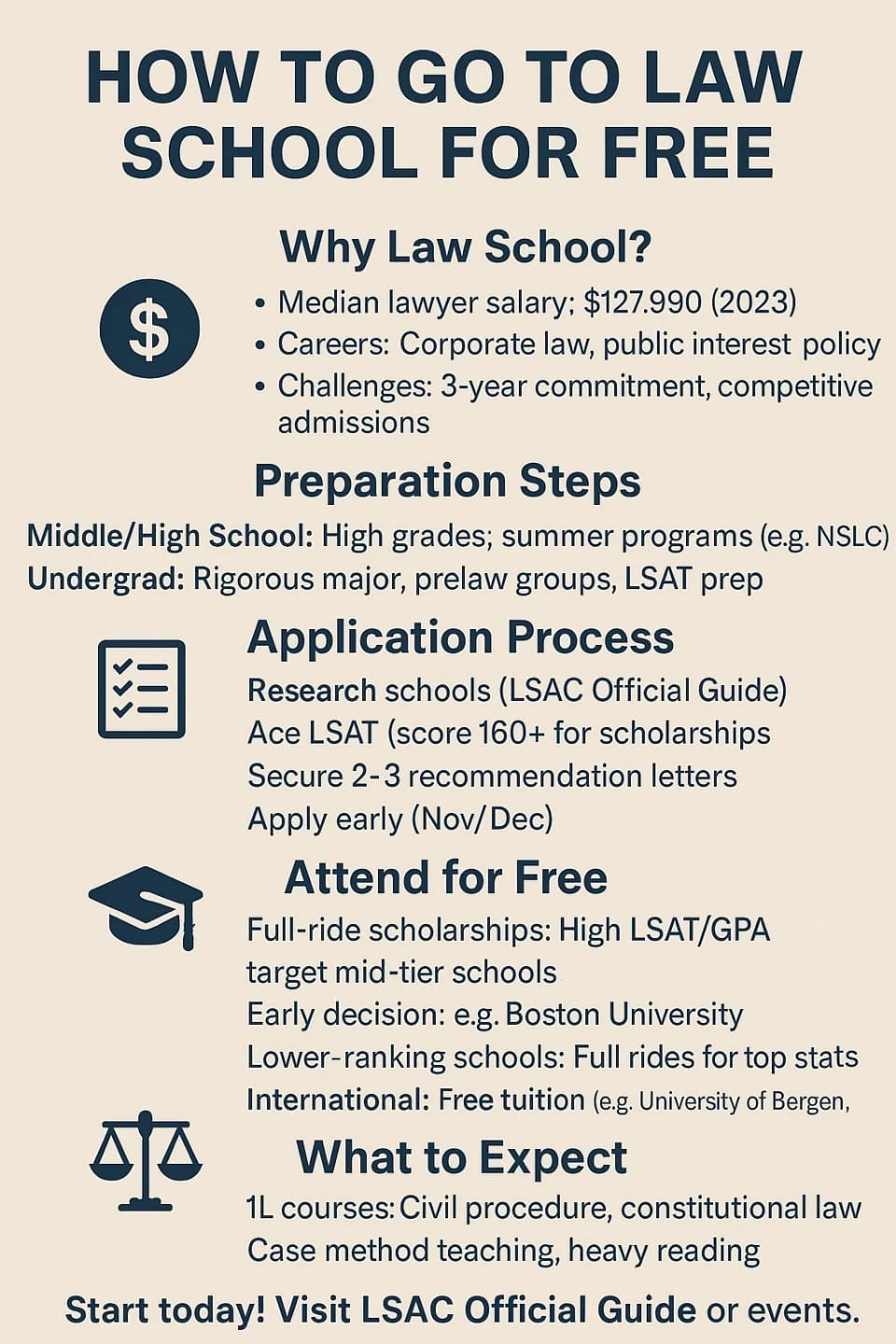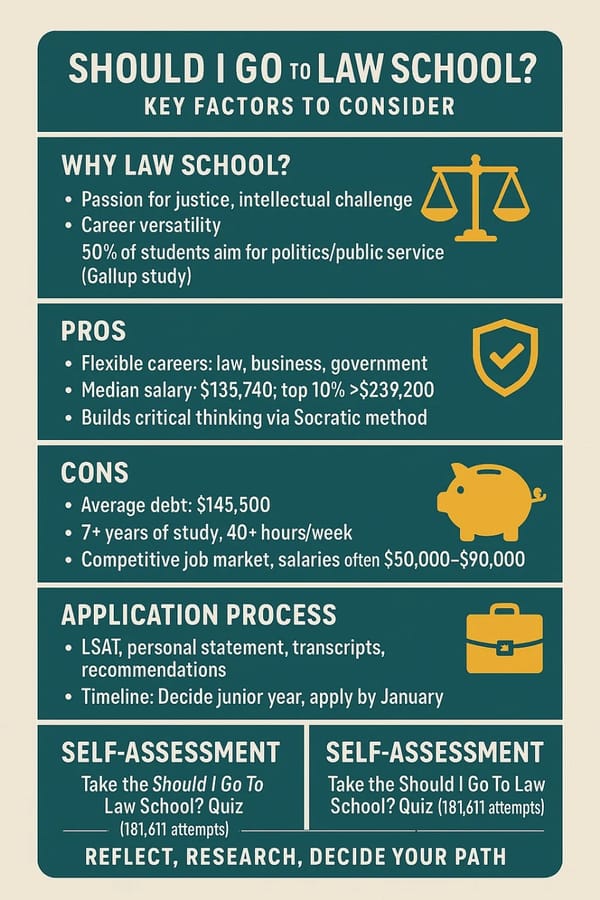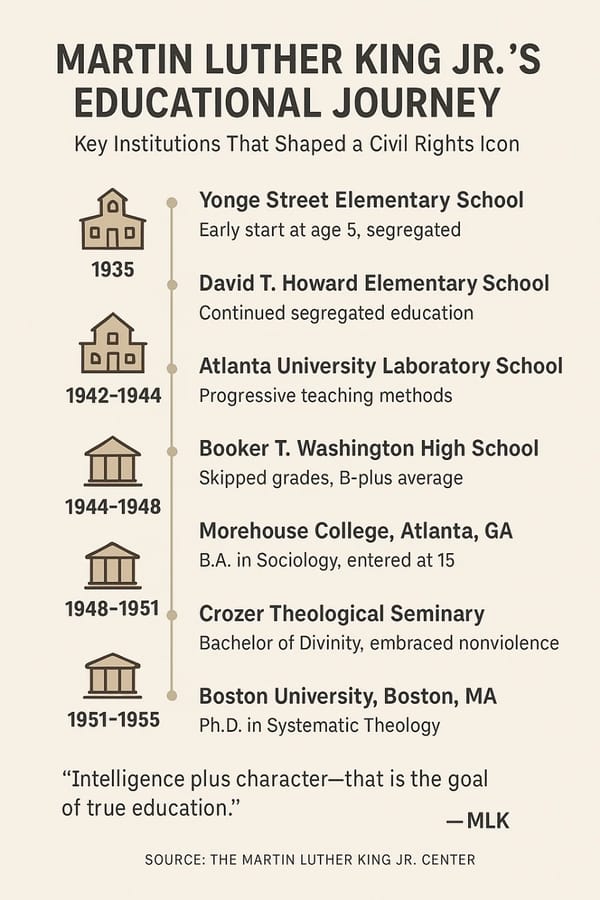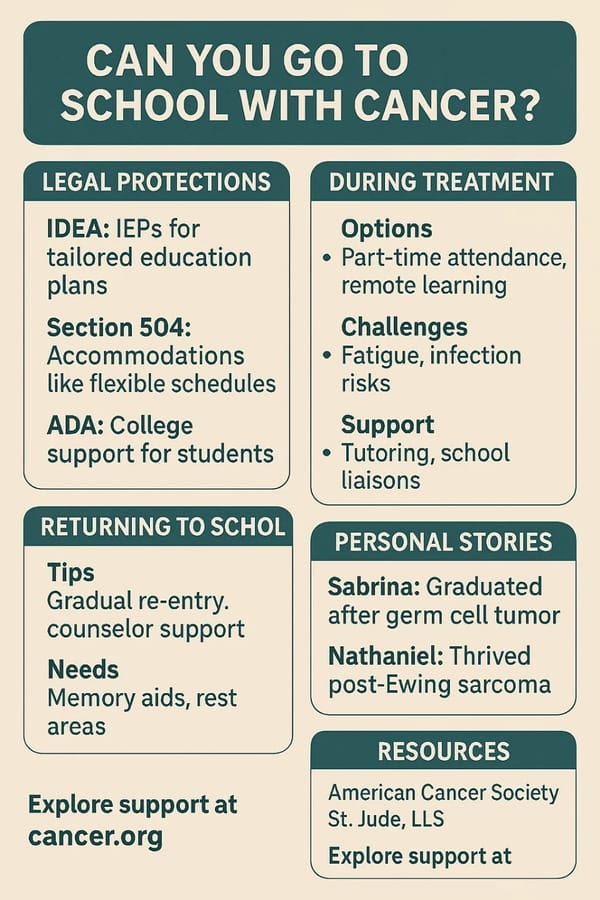Explore the Possibility of Attending Law School Without Financial Burden
Introduction: Why Law School Matters
Attending law school helps many people achieve their dream of becoming a lawyer and provides opportunities for intellectual growth along with diverse career options and the potential for societal impact. Attending law school leaves graduates with an average debt of $130,000 which appears to be an insurmountable barrier. Imagine the possibility of completing law school without paying tuition fees. Aspiring law students will find this guide's detailed roadmap essential for preparation and application processes while learning how to secure full-ride scholarships and explore free international programs. This article provides actionable guidance for high school students who want to enter law school and college graduates seeking their next move so they can reach their goals without financial strain.
Why Choose Law School?
A law degree provides access to diverse professional opportunities that include corporate law positions along with public interest advocacy roles. The U.S. Bureau of Labor Statistics states that lawyers earned a median annual wage of $127,990 in 2023 while top-paid lawyers in private firms reached $190,000. Law school teaches students critical thinking and argumentation skills which attract those who value intellectual challenge beyond monetary benefits. Many find personal fulfillment through their work as they fight for justice and create new policies.
However, challenges exist. The three-year educational journey and bar exam preparation together require students to show both dedication and self-control. Applications to law school remain highly competitive and necessitate excellent academic performance along with high LSAT results. The benefits of pursuing law still surpass its costs for individuals who hold a genuine interest in this field. As one law student shared on The Girl’s Guide to Law School, My law school experience pushed me beyond my limits yet enabled me to confidently face complicated challenges.
Preparing for Law School: Start Early
The key to achieving success in law school is thorough preparation. Starting early strengthens your law school application. Here’s how to prepare at different stages:
For Middle and High School Students
Students need top grades because they secure college admissions which lead to law school opportunities. You can test your interest in legal careers by volunteering at law firms or shadowing practicing attorneys. Summer programs like the National Student Leadership Conference provides practical legal experience that helps develop skills and ignites interest. The mock trial camp experience demonstrated to one high school student why law was exciting and led him to start planning his future career path.
For Undergraduate Students
Select a demanding academic program such as philosophy, political science or history to cultivate strong analytical abilities. Connect with prelaw organizations for networking opportunities and support while attending law school events found on the LSAC website. Start LSAT preparation early using LSAC’s Official LSAT Prep. To learn about the LSAT format you should utilize LSAC’s Official LSAT Prep tool. Researching schools through the LSAC Official Guide to ABA-Approved Law Schools enables students to match their objectives with law program strengths.
The Law School Admission Council provides students with a structured preparation plan tailored to different academic stages.
| Student Level | Preparation Steps | Relevant Resources |
|---|---|---|
| Middle School Students | maintain high grades and attend summer enrichment programs | National Student Leadership Conference |
| High School Students | choose difficult classes and attend law school events to learn about legal careers | LSAC Events |
| First-Year Undergraduates | discuss their plans with a prelaw advisor and select a demanding major while participating in prelaw organizations | LSAC Events |
| Second- and Third-Year Undergraduates | start researching law schools and attending LSAC Law School Forums while beginning their LSAT preparation | LSAC Official Guide, LSAC Forums |
| Fourth-Year and Beyond | finalizing schools to apply to and enhancing LSAT preparation while obtaining necessary recommendations to submit early applications | LSAC JD Account, LSAC Forums |
Navigating the Law School Application Process
Navigating the law school application process requires long-term dedication similar to running a marathon. Here’s a step-by-step guide to ensure success:
Researching Law Schools
Evaluate law school options based on location, cost, reputation and specialized academic areas such as environmental law or intellectual property rights. Use the LSAC Official Guide to evaluate different schools while attending LSAC Law School Forums to get direct feedback from admissions officers.
Mastering the LSAT
The LSAT serves as a standardized assessment tool that evaluates reading comprehension and logical reasoning abilities while being a vital element. The LSAT is administered several times throughout the year and demands at least two months of targeted preparation. Building confidence while preparing for the LSAT requires practice through LSAC’s Official LSAT Prep resources. Achieving an LSAT score of 160 or higher greatly increases your likelihood of obtaining scholarships which will be expanded upon later.
Crafting a Personal Statement
Your personal statement presents an opportunity to stand out. Emphasize your educational background and personal drive while demonstrating your suitability for law school in your personal statement. Follow tips from UC Davis on writing strong personal statements and consider attending personal statement workshops. The essay written by one applicant I guided about facing adversity impressed the admissions committees.
Securing Letters of Recommendation
Seek 2 to 3 recommendation letters from professors or employers who have a strong understanding of your abilities. Develop professional connections early via office hours or common interests. UC Davis offers guidance on requesting recommendations to ensure strong, personalized letters.
Managing Your Timeline
Begin your applications between 6 and 9 months ahead of deadlines which usually start in late fall. Applying early—by November or December—improves scholarship odds. Prioritize both your academic work and self-care while managing applications to prevent burnout.
How to Attend Law School for Free
Through careful planning you can attend law school without accumulating debt. Here are proven strategies:
Secure Full-Ride Scholarships
Law schools offer better scholarship opportunities to candidates with high LSAT scores and GPAs that surpass their median. Choose law schools where your academic performance stands above their average as identified by US News. For example, Yale Law School presents full-tuition scholarships to 45-50 JD students through the Soledad ’92 and Robert Hurst Horizon Scholarship Program. An associate with a 170 LSAT score tested this strategy by applying to a mid-tier law school and receiving a full scholarship offer.
Apply Early or Via Early Decision
Early decision applications, like those at Boston University, demonstrate student commitment which could lead to significant aid packages including full scholarships. Applying early allows students access to wider scholarship resources.
Consider Lower-Ranking Schools
Lower-tier schools commonly provide full-scholarships to draw talented students towards their programs. Prospective students should evaluate their career ambitions alongside potential cost savings because these schools deliver high-quality education suited for regional or public service careers.
Explore International Options
A number of countries provide law programs that students can attend for free or at reduced fees. The University of Bergen in Norway offers an English-taught Master in Law program which costs nothing for students interested in international law. Similarly, Heidelberg University in Germany charges ~$3,000 USD/year for international students. The Arctic University of Norway (UiT) Students can access free tuition from Arctic University of Norway (UiT) which concentrates on environmental law studies. When deciding between these options keep in mind both language barriers and the differences between legal systems.
Find free and affordable law school opportunities listed by Juri Education.
| Strategy | Details |
|---|---|
| Scholarship Tips | - Perfect LSAT Prep: Achieving an LSAT score above 160 qualifies you for scholarships with help from Juri Education. - Strong Application: Compelling personal statement and resume boost aid. - Apply Early: Choosing early decision programs like Boston University could result in a full-ride scholarship. - Target Lower-Ranking Schools: Full-ride likely if GPA/LSAT exceed medians. |
| Free/Low-Cost International Schools | - University of Bergen, Norway: Students can study for a Master in Law at the University of Bergen without any tuition fees. - Heidelberg University, Germany: ~$3,000 USD/year for internationals (Heidelberg Tuition). - Arctic University of Norway (UiT): International students can attend the Arctic University of Norway (UiT) without tuition fees to study environmental law (UiT Admission). |
What to Expect in Law School
Law school is rigorous but transformative. The initial year of law school teaches essential subjects such as civil procedure, constitutional law, and legal writing through the case method which develops students' critical thinking abilities. Students need to prepare for extensive reading materials that reach hundreds of pages every week while their grades depend heavily on final exam performance. Students who participate in moot court competitions or law journal activities can improve their abilities and enhance their resumes. One student from The Girl's Guide to Law School suggested that structuring law school as a regular 9-to-5 job helped her maintain organization and prevent burnout.
Conclusion: Take the First Step Today
Careful planning enables you to attend law school with minimal financial burden as it serves as a gateway to a fulfilling career. Develop a solid academic background from the beginning and thoroughly prepare for the LSAT while planning your applications to increase your scholarship opportunities. Evaluate international law schools when they match your educational objectives. The path to law school demands dedication, but the rewards—intellectual growth, diverse career paths, and financial freedom—are well worth the effort. Start today by exploring programs on the LSAC Official Guide or signing up for an LSAC event. Take the first step toward your legal future now—what’s holding you back?






